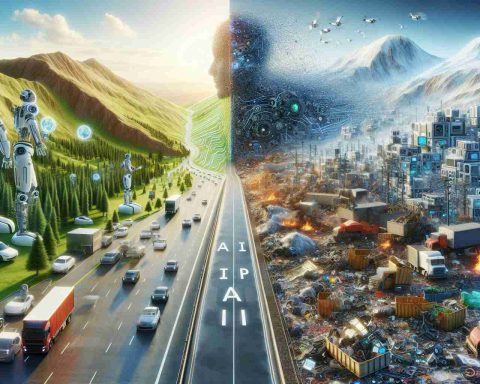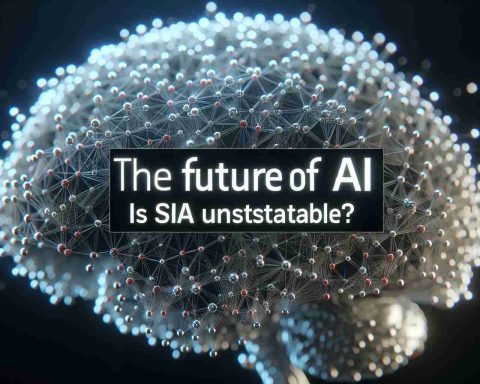Utilizing cutting-edge artificial intelligence technology, a team of students from Delft is reshaping the landscape of conservation initiatives. Instead of focusing on physical products, the team, known as Epoch IV, harnesses AI to tackle diverse challenges and emerges victorious in competitions.
Shifting away from conventional methods, Epoch IV is currently gearing up for a competition that involves identifying bird species based on forest chirps, replacing manual bird counting with audio analysis. Additionally, the team is delving into the realm of predicting protein binding to aid in drug development, showcasing the far-reaching implications of AI in the medical field.
Despite being a relatively small team, Epoch IV’s expertise shines on the international stage. Their recent triumph in a competition hosted by the Woods Hole Oceanographic Institute underscores their prowess in utilizing AI to analyze satellite imagery and locate underwater kelp forests, essential for biodiversity conservation.
Driven by a commitment to meaningful goals, Epoch IV navigates competitions with a focus on impactful projects often overlooked by profit-driven enterprises. By aligning their endeavors with the United Nations’ sustainable development goals, the team pioneers AI applications in healthcare and environmental preservation.
While the team’s members possess the skills to launch ventures based on their AI knowledge, the primary objective of Epoch IV remains centered on leveraging technology for the collective good. With a collaborative spirit prevailing in competitions, participants freely exchange innovative techniques, fostering progress in addressing complex societal issues.
In an era where technological innovation intersects with environmental conservation, Epoch IV represents a beacon of hope, demonstrating how AI can revolutionize conservation efforts and pave the way for a sustainable future.
Revolutionizing Conservation Efforts Through AI Evolution: Unveiling New Horizons
As the realm of conservation efforts witnesses a transformation propelled by artificial intelligence, a groundbreaking narrative unfolds beyond the triumphs of Epoch IV. Amidst the fervor of innovation, key questions emerge, shedding light on the opportunities and challenges within this dynamic landscape.
What are the untapped possibilities of AI in conservation beyond Epoch IV’s current projects?
While Epoch IV exemplifies the potential of AI in diverse conservation domains, a myriad of unexplored avenues beckon further exploration. From automating habitat restoration processes to optimizing wildlife corridor planning using AI algorithms, the scope for leveraging artificial intelligence for conservation knows no bounds.
What are the key challenges associated with integrating AI into conservation practices?
One pivotal challenge lies in balancing the ethical implications of AI utilization in conservation. Ensuring transparency in data collection, addressing biases in algorithmic decision-making, and safeguarding privacy rights are critical considerations that warrant careful navigation. Moreover, the accessibility of AI tools to conservation practitioners in resource-constrained regions poses a significant challenge that demands proactive solutions.
Amidst the enthusiasm surrounding AI-driven conservation initiatives, what controversies or ethical dilemmas have surfaced?
The intersection of AI and conservation has sparked debates around issues such as algorithmic accountability and the potential displacement of human expertise by machine learning systems. Ethical dilemmas regarding the reliance on automated decision-making processes in conservation actions and the broader implications of AI on biodiversity management continue to fuel deliberations within the conservation community.
Advantages and Disadvantages of AI Evolution in Conservation:
Advantages:
– Enhanced efficiency in data analysis and pattern recognition, enabling quicker insights for conservation decision-making.
– Facilitation of large-scale monitoring and assessment of ecosystems, amplifying conservation impact and effectiveness.
– Potential for predictive modeling to anticipate environmental changes and guide proactive conservation strategies.
– Opportunity for enhancing public engagement and awareness through interactive AI-driven platforms, fostering community involvement in conservation efforts.
Disadvantages:
– Risks of overreliance on AI algorithms, leading to potential biases and inaccuracies in conservation decision-making.
– Concerns regarding data privacy and security in the collection and utilization of sensitive environmental data through AI systems.
– Challenges in ensuring equitable access to AI technologies across diverse conservation stakeholders, limiting the inclusivity of conservation initiatives.
– Ethical considerations surrounding the delegation of conservation responsibilities to AI systems, raising questions about the role of human judgment and values in conservation practices.
In navigating the complexities of AI evolution in conservation, a balanced approach that integrates technological advancements with ethical principles is paramount to fostering sustainable outcomes. As conservationists and technologists converge to harness the transformative power of AI, the quest for a harmonious coexistence between innovation and preservation sets the stage for a future where conservation efforts transcend conventional boundaries.
For more insights on the intersection of AI and conservation, visit International Union for Conservation of Nature (IUCN).

















